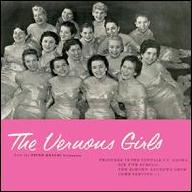They still didn't sound very distinctive, however, until the end of the 1950s when the Vernons Girls became a trio and began aiming for the youth market. This classic lineup consisted of Maureen Kennedy, Jean Owen, and Frances Lee, with Lyn Cornell coming in as a replacement and Joyce Barker (future wife of Marty Wilde and mother of Kim Wilde) passing through. Their names weren't used on the records where they only provided accompaniment, where, if they were billed at all, it was simply as "Two Vernons Girls" or "Three Vernons Girls." They didn't succeed in charting records of their own until 1962, when they were signed to Decca. Their cover of the Drifters' Lover Please sold well enough to ride the best-seller lists for nine weeks, and the Liverpool-style You Know What I Mean made the U.K. charts two separate times in 1962. Unfortunately, like a lot of English acts that really didn't control their repertory or their direction, the Vernons Girls were at the mercy of producers who didn't always clearly see the direction the public's taste was taking. So their competent cover of The Loco-Motion was followed by a very, very dopey-sounding Dat's Love and several sub-Connie Francis-style teen pop efforts. There was no consistency to their work, which wore out any welcome that they might have had from the listening public, and certainly no thought given to what was happening to music around them.
By the end of 1963, when they were doing novelty songs like We Love the Beatles, the Vernons Girls were quaintly anachronistic holdovers from a pop music world whose landscape was already being shaken seismically by the Beatles et al. They tried hard with Do the Bird, which had a hard-rocking beat and what could pass for a soulful sound, especially the lead singing, but it barely registered on the charts. An almost equally deserving record, I'm Gonna Let My Hair Down, disappeared without a trace. And then their next single was an annoying novelty number called Mama Doesn't Know -- with repertory like that, they were doomed, even as they tried various new sounds, even opting for something akin to Dusty Springfield's Wall of Sound accompaniment. The sheer inconsistency of their records probably contributed to their eventual demise. The Vernons Girls vanished in 1964, although their ex-members remained in the business, singing in various vocal groups -- most notably the Breakaways, whose accompaniments graced dozens of fine records by other artists (including the pre-King Crimson trio of Giles, Giles Fripp) -- for years to come. Some older British listeners retain a fondness for the Vernons Girls, however, and the group's best records remain listenable and enjoyable over 40 years later. ~ Bruce Eder, Rovi














